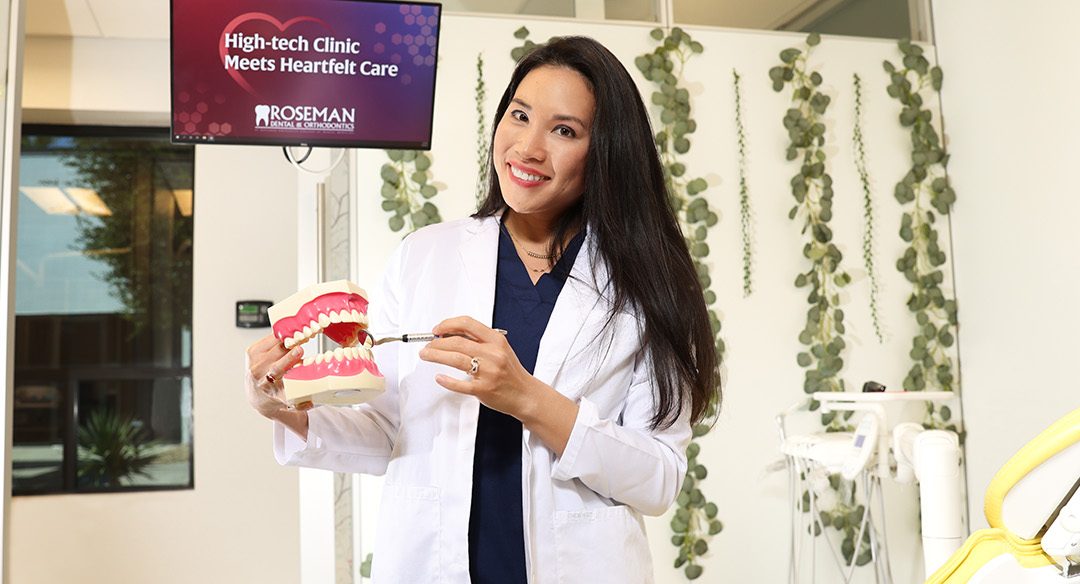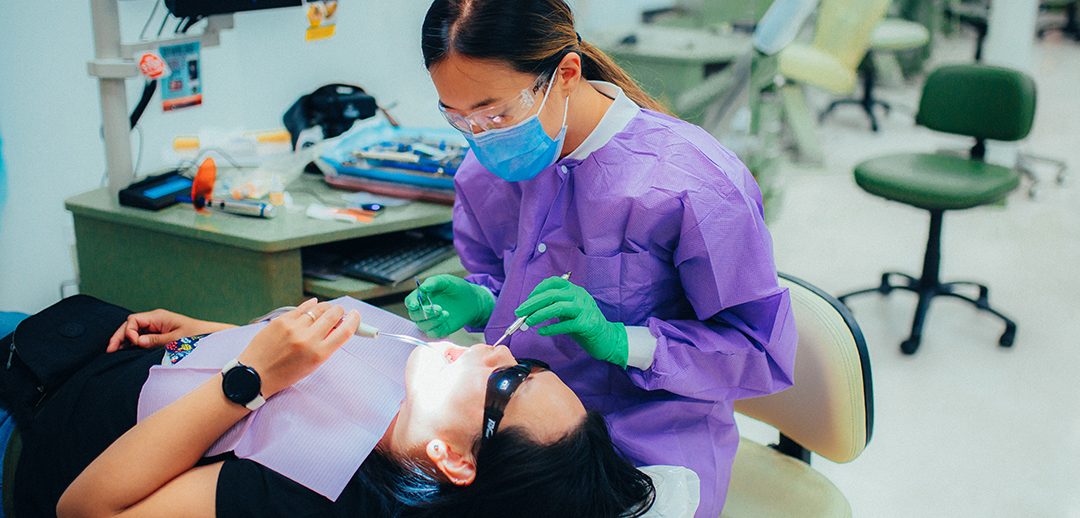
by Roseman Dental | Sep 14, 2022 | Dental 360, Dental Clinic Blog, Providers - NV, Roseman Dental - NV
Dr. Chen recently joined Roseman’s College of Dental Medicine as a board-certified Pediatric Dentist at Roseman’s clinics in Henderson and Summerlin, NV. With a warm smile, kind face and gentle way about her, it is immediately obvious that she has a gift for connecting with children. Dr. Chen knew from a young age that she wanted to be a healthcare provider and that she wanted to use her hands in her profession. Shadowing an optometrist and dentist in high school, she connected quickly with the practice of dentistry but she had no particular plans or interest in treating children. Though Dr. Chen is the eldest of two girls in her family, she did not have a great deal of experience with or an affinity towards children, yet she found that her passion for pediatric dentistry grew while in her second year of dental school in Boston. She received her dental degree from Boston University and her specialty training in Pediatric Dentistry at Temple University. Originally from California, Dr. Chen received her bachelor’s degree in Psychology from UCLA with an emphasis in Developmental Psychology. In dental school, Dr. Chen worked alongside caring, compassionate faculty who took a great interest in mentoring her. Through this, she realized how important it was her to not only to provide preventative care, but to also ease pain and discomfort. Dr. Chen was born to parents who guided her not to a specific profession or interest, but toward an ethos, “be helpful and to take care of others.” She has most certainly followed this guidance in her professional life.
After a decade in private practice, in 2021, Dr. Chen made a personal decision to focus more time on the practice of pediatric dentistry and to let go of some of the administrative and business tasks associated with running a practice. When the opportunity arose at Roseman Dental & Orthodontics, it seemed like a perfect fit. “The opportunity at Roseman gave me the chance to place greater focus on doing what I love most—treating children. I couldn’t be happier about the opportunity to work in both of Roseman’s clinics. The entrée into academia also offered her the chance to return some of the goodwill and guidance offered to her by faculty when she was a student. In her new role, Dr. Chen has the chance to shape and inspire future providers.
Roseman Dental & Orthodontics, in addition to providing care to adults and children, is the home of the Advanced Education in General Dentistry (AEGD) residency, which hosts 2 residents per year through a partnership with NYU Lutheran Dental Medicine. These dentists receive advanced training through Roseman Dental & Orthodontics and are exposed to more complex cases. In her position, Dr. Chen is able to work alongside these residents, shaping their experiences and developing patient-centered practitioners while treating children. Roseman Dental & Orthodontics’ dental clinic also refers patients to Roseman Dental & Orthodontics’ ortho clinic, which is at the same address and next door.
Dr. Chen also practices at Roseman’s newest dental family member, Roseman Dental – Summerlin, Roseman’s pediatric dental clinic focused exclusively on treating medically compromised children in need of specialized dental care. Dr. Chen works alongside Dr. Michael Cottam, Clinic Director, to treat patients of Roseman’s partner organization, Cure 4 The Kids (C4K). C4K treats children with cancers, blood diseases and other life-threatening diseases. These children often put their dental needs aside, yet they need a dental home with dentists that work alongside their physicians to deliver what is often specialized care.
Dr. Chen is a beloved healthcare provider in the Nevada community. She brings to Roseman extensive experience, a deep commitment to improving the welfare and health of children, and a warm sense of optimism about her work. Dr. Chen and her husband Dr. Matthew Raddue, an anesthesiologist, enjoy being parents to their two children. Welcome Dr. Chen!

by Roseman Dental | Apr 11, 2022 | Dental Clinic Blog, Dental School, Roseman Dental - NV, Roseman Dental - UT
Perhaps you were the kid that wanted to see the rat skull in your friend’s backyard because you wanted to look at its teeth. Maybe you are the type of person now that analyzes dental problems when someone you meet first smiles. Some people are just meant to be dentists!
There are many different areas of specialization to explore beyond general dentistry. No matter what your specific fascinations, there’s a particular path of education that can be tailored to fit. The American Dental Association recognizes twelve unique specialties, each of which requires an advanced expertise:
Dental Anesthesiology
Professionals in this field manage patients’ pain, anxiety, and overall health through dental diagnoses and procedures.
Dental Public Health
Dentists in this field work to prevent dental diseases within a community and control any diseases that arise, as well as promote public awareness of the need for oral health care.
Endodontics
This specialty focuses on the condition of the human dental pulp (the inside part of the tooth) and tissues. Dentists study the biology of the pulp and how to prevent, diagnose, and treat diseases there.
Oral and Maxillofacial Pathology
These dentists research and treat conditions, diseases, defects and injuries causing and/or contributing to functional and aesthetic problems in the mouth, teeth, jaws and face.
Oral and Maxillofacial Radiology
These specialists interpret radiology scans to diagnose diseases or show the general condition of the mouth, teeth, jaws and face.
Oral and Maxillofacial Surgery
Dentists with this advanced degree have specific expertise in corrective surgery for problems with the tissues in the oral and maxillofacial regions.
Oral Medicine
Specialists in this area focus on oral healthcare for medically complex patients, along with diagnosing and managing medically related conditions affecting the mouth, teeth, jaws and face.
Orofacial Pain
Orofacial pain specialists diagnose, manage and treat pain disorders affecting the jaw, mouth, face, head and neck.
Orthodontics and Dentofacial Orthopedics
These specialists correct the improper placement of the teeth with braces and other therapies.
Pediatric Dentistry
Dentists in this specialty work with infants and children to provide preventative and therapeutic dental services.
Periodontics
This specialty includes the prevention, diagnosis and treatment of problems with the tissue surrounding the teeth.
Prosthodontics
Prosthodontists provide solutions and comfort for people suffering from deficient or missing teeth.
The first step for any of these dental specialties is to get a degree in general dentistry, or a Doctor of Dental Medicine (DMD) degree. If any of these specialized fields seem particularly interesting, then you might want to consider continuing your education with advanced degrees or getting the proper certifications to do what you love in the field of oral health.
Curious about becoming a dentist? Take a look at Roseman University’s College of Dental Medicine.
by Roseman Dental | Mar 3, 2016 | Dental Clinic Blog, Oral Health, Roseman Dental - NV, Roseman Dental - UT
Finding your child a dentist is something like hiring a lawyer – you don’t want to just pick one at random. That being said, it is recommended that kids see their first dentist when either their first tooth grows in or they reach their first birthday for their best chance at establishing healthy, lifelong oral hygiene habits.
How should you go about picking a pediatric dentist, however, and how can you be sure to find one that is experienced, professional and yet still great at making little ones feel at ease? When it comes to the initial search, consider the following.
Casting a Net to find a Qualified Pediatric Dentist
When on the hunt for a qualified pediatric dentist, you may find it helpful to:
- Consult friends or family members. A personal recommendation from a long-time client is tough to top.
- Check out the American Academy of Pediatric Dentistry database and search it for professionals in your area.
- Ask your pediatrician. Few people have a better grip on child health care needs and offerings in your community than your existing pediatrician.
- Search local review sites. This is also a great way to gather more information about a potential pediatrician you haven’t quite decided whether to see.
Once you have a few prospective professionals, you can start to research them further by name.
Additional Considerations in Choosing a Pediatric Dentist
Some parents prefer to have their children visit the same dental office that they do. If this sounds like you, that may be fine, depending on the age of your children. However, many younger children benefit from cheery, brightly colored environments designed and intended for kids. They also may find that the waiting room in pediatric dentist’s offices generally have more to offer the younger set than a few old magazines.
Finally, consider the unique needs and personality traits of your child. If they are generally timid or fearful of the dentist, you’ll want to factor this in in making your final decision and be sure to choose an office where he or she will feel especially comfortable and at ease.
by Roseman Dental | Dec 3, 2014 | Dental Clinic Blog, Oral Health, Roseman Dental - NV, Roseman Dental - UT
Many parents wonder how much attention should be paid to the health of their children’s smiles, especially at early ages when there are no teeth present or when they just have their “baby teeth” that will eventually fall out and be replaced by permanent teeth. The best oral care for children should be started before baby teeth even come in. Starting early and beginning a regular habit of oral hygiene can set children up to have healthier teeth in the long run. As a parent you should bring your children along for visits starting as early as possible.
Starting Early
While most babies do not begin to get teeth until well into their first year of life, those teeth are still present beneath the gums, and parents can start early to keep their baby’s mouth clean. Running a damp washcloth over a baby’s gums at least once a day can help to wipe away bacteria. Once the teeth begin to come in, parents can use a soft-bristled toothbrush designed for infants along with a small dab of toothpaste to brush the tiny teeth until about age two. Once children are able to spit on their own, they should be able to brush with a pea-sized amount while supervised.
Prevention Begins at Home
While visiting a dentist can help ensure that a small child’s teeth are being cared for properly, parents are the best source of prevention against tooth decay. Practicing good habits and establishing routines that promote healthy teeth can keep children from requiring extensive dental work in the future. When a small child attends an appointment at a dental office, the dentist can help parents identify eating or drinking habits at home that might be causing problems. While it may be more convenient for mom and dad, putting a child to bed with a bottle can lead to decay and other issues and should be avoided. Additionally, the consumption of too much sugar can create cavities, so children should drink water instead of sugary juices, milk, or soda. Both of these problems can be solved at home.
Dental visits should be encouraged for children at an early age to begin the path to good oral health for a lifetime.




